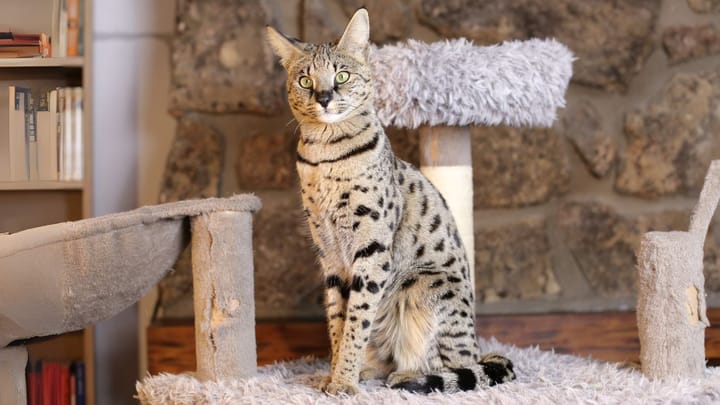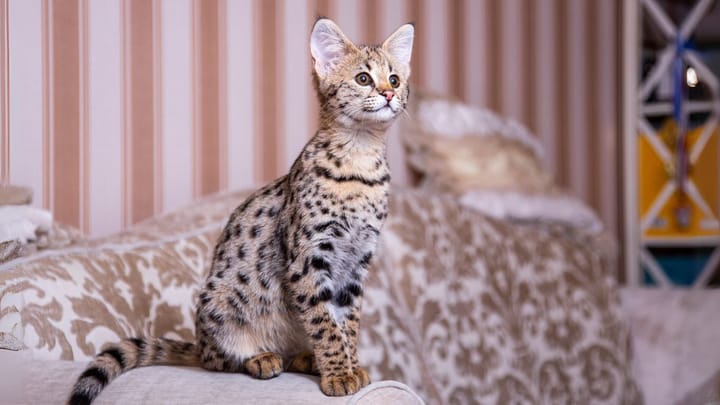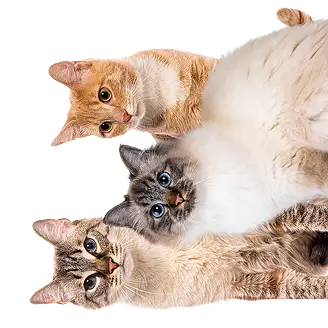Savannah


The Savannah is a hybrid breed, originating from a cross between a domestic cat and a Serval, a wild cat from Africa. They are athletic, graceful and have the charm of their wild ancestors.
|
Life expectancy |
The Savannah has a life expectancy of between 13 and 20 years |
|
Temperament |
|
|
Adult size |
Female
Between 12 and 17 in
Male
Between 12 and 19 in
|
|
Adult weight |
Female
Between 11 and 26 lb
Male
Between 11 and 26 lb
|
|
Coat colour
According to the specialised nomenclature, black cats, brown spotted tabby, black silver spotted tabby and black smoke are accepted. In any case, the Savannah has a spotted coat. |
Black Brown |
|
Type of coat
Short |
Short |
|
Eye colour
Golden yellow, Green |
Green
Yellow
|
|
Purchase price |
The Savannah costs between £1500 and £2600 |
The Serval is present mainly in sub-Saharan Africa. According to the International Union for the Conservation of Nature (IUCN), the natural populations of this wild cat are stable. Moreover, Servals are most common in places where their habitat (savannah and other open environments) is protected. However, we must remain vigilant and continue to conserve this habitat, because its decline is rapid in certain areas.
More details about the Savannah
Savannah: Origins and history
The Savannah comes from the cross between the domestic cat and the Serval, Leptailurus Serval, a cousin species. Indeed, the cat and the Serval are both part of the Felidae family and are sufficiently similar from a genetic point of view to hybridize.
Since ancient times, the wild cat has accompanied humans in their daily lives as pets and as hunting assistants. Hybridisation of Servals with the domestic cat began in the 1980s and the breed was officially accepted in 2001.
Physical characteristics of the Savannah
The Savannah displays the characteristics of both animals from which they descend. A slender cat, on tall legs. Their heads are small with large ears. Their spotted coat gives them a unique, wild and captivating look.
Savannah: Characteristics
Savannah: Behaviour
Breed compatibility Savannah
Kot savannah - cena
The price of a Savannah kitten varies enormously according to the sex and the generation of the individual, calculated since the initial cross with the Serval. On average, they cost between £1500 and £2600. Lineage, breeder and age also influence the cost. It costs at least £35 / month to provide for their needs, by offering a quality diet and ensuring their good health.
Savannah: Grooming
Regular maintenance of the fur, eyes and ears is all that is required.
Savannah: Health
The average life expectancy for this breed is between 13 and 20 years.
Savannahs are considered robust. Their thick undercoat protects them from the weather and they are typically healthy.
Many factors influence the risk of feline obesity, such as age, environment, diet and activity levels. Their high energy reduces their risk of becoming overweight as long as their need for physical activity is met.
It is generally recognised that the Savannah enjoys good physiological health. However, an annual medical checkup is suggested to ensure your cat’s well-being. Indeed, they can suffer the same diseases as domestic cats that are not crosses, including oral diseases. In addition, the following illness is sometimes diagnosed:
- Pyruvate Kinase deficiency, or "PKDef". This is a hereditary disease that can lead to nonspecific anemia. A genetic test is however available.
Breeding is allowed with another Savannah or with the following pedigreed domestic cats; the Egyptian Mau, the Oriental Shorthair and the Ocicat. Mating is also accepted with a Serval, provided that they comply with the regulations in force concerning the possession and reproduction of wild exotic species (notably CITES Appendix 2).
On average, the litters are of 3 kittens.
Do you want a Savannah cat ?
Frequently asked questions
Are Savannah cats good pets?
Considering their genetics, Savannahs have a high prey drive, are extremely inquisitive, and have the physical dexterity to get into a lot of trouble if they want to! For this reason, they might not be the best choice for first-time cat owners. However, they can be extremely loyal, affectionate, and are even considered social with other animals, especially when they are properly socialised from a young age. So they can make wonderful pets for the right owners!
Want to find out which cat breed is perfect for you?
Can I have a Savannah cat in the UK?
F2, F3, and F4 generation Savannah cats are legal to purchase from breeders in the UK. However, F1 generation Savannah cats, meaning one of the parents is a Serval, require a Dangerous Wild Animal Licence to own. F1 generation Savannahs are more difficult to handle and require an expert owner.
Check out 5 other cat breeds that look like wild animals!
Do Savannah cats like to be held?
Considering they have somewhat ‘wild’ genes, Savannah cats are not the most affectionate of breeds. F1 generation Savannahs in particular can be independent and might prefer their own space to a cuddle on the sofa. However, F2, F3, and F4 generation Savannahs are a little more human-oriented and can bond closely with their owners. If well-socialised, they can make friendly pets, even around strangers.
Find out which cat breeds like to cuddle the most!
What does F mean in cats?
The ‘F’ in F1, F2, F3, and F4 generations stands for ‘filial’. These nominations represent how many generations your Savannah cat is from the Serval parent. F1 generation Savannahs are quite rare as it is difficult to successfully breed a domestic cat with a Serval, and the resulting offspring is illegal to own without a license.
Check out the top 10 rarest cat breeds!
Can I let my Savannah cat outside?
You should let your Savannah cat outside as they love the outdoors. However, their love of adventure can be quite dangerous if they are left unsupervised. It is recommended to build a catio in your backyard and to train your Savannah to walk comfortably at the end of a lead. That way, you can fulfill your cat’s needs all the while ensuring that they remain safe at all times.
Top tips on lead training your cat






